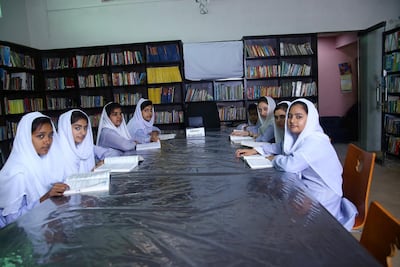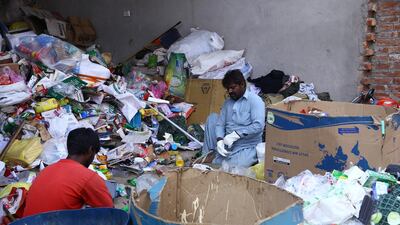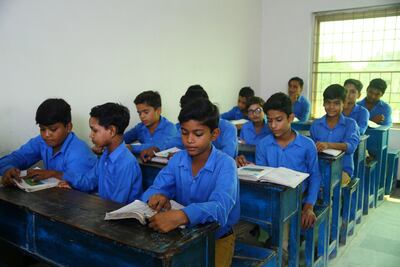A Pakistani woman is funding education, food and medicine for over 5,000 impoverished children in the eastern city of Lahore by collecting and selling on rubbish.
Robina Shakeel and her team collect waste from around 8,000 houses in the densely-populated city, sorting plastic bottles and reusable items from the rubbish.
They sell their collected items at a local recycling market for around 1.7 million rupees ($10,841) a month, enough to support about 40 per cent of the expenses for the eight schools she runs providing education to orphans and the children of slum dwellers, labourers, and other underprivileged groups
“The waste and trash of the city is a valuable resource for us as it is helping us provide quality education, food and medicines to girls and boys of the lesser God,” Ms Shakeel, chairperson of the Aabroo [honour] Educational Welfare Organisation, told The National.
Pakistan has the world’s second-highest number of children out of education, with an 44 per cent (an estimated 22.8 million) of children aged 5 to 16 not attending school, according to the United Nations Children's Fund Unicef.
Children not receiving an education often end up in gangs of street beggars, scavengers and sometimes in the hands of criminals and militants, the International Association of Youth and Family Judges and Magistrates found.
“We all seven siblings are studying here [at Aabroo school] in different grades … we are getting free education, food, uniform and books. This school is a shelter for us,” said Arooj Mahmood, 13, daughter of a labourer who earns a daily income and lives in a slum on the outskirts of the city.
Ms Mahmood said that her father could not afford to send them to a public or private school due to rising inflation and poor economic conditions.
Pakistan was facing the threat of default when Prime Minister Imran Khan took power in August 2018. The government received a $6 billion rescue package from Saudi Arabia, including a deposit of $3 billion to avert a payment crisis besides getting loans from China and UAE for the same purpose.
In July this year, the International Monetary Fund approved a $6 billion bailout package for Pakistan. Due to 27 per cent devaluation of the rupee against the dollar during this regime, masses are facing high inflation in Pakistan.
"I want to become a doctor and hope this school will help materialise my dream," Ms Mahmood told The National while sitting on a wooden bench in her small classroom with different colourful handmade drawings fixed on its walls.
Ms Shakeel’s journey to educating thousands of Lahore’s poorest children began eighteen years ago, with her providing free lessons to five local children from the porch of her home. Since then her initiative has gone from strength to strength.
Sitting in a low-cost, simple office in the outskirts of Lahore, the 52 year old said: “My basic mission is to educate poor children living in slums, to bring a positive change in their lives, who are unfortunately denied a respectful life in society.”
Speaking about the 8,000 homes her team collects waste from, she adds, “the waste collected from a single house in four weeks is enough to meet educational expenses of a child monthly.”
Aabroo Educational Welfare Organisation also runs an ‘adopt a child’ programme to meet the rest of their costs.

Greenpeace ranked Lahore in the world’s top ten most polluted cities last year. The residential waste collection and its subsequent recycling are not only providing free of cost quality education to children, but cleaning the city at the same time.
Next to one of the eight schools her organisation funds stands a large warehouse where the waste is sorted and segregated by item before selling it at the local market.
“We sell these sorted out items including plastic bottles, electronics items, cooking utensils, pieces of cloths and paper in the recycling market,” Zahid Qureshi, 50, a caretaker of the warehouse told The National.
He said that pieces of cloth found in the trash were used to stitch eco-friendly shopping bags which were later sold in the market. “We spend each penny collected through the waste on welfare of our students,” he said. “They are like our own children.”
In Pakistan, 38 per cent of children suffer from stunted growth due to lack of appropriate nutrition - one of the highest prevalences in the world, according to Unicef. To meet this challenge, at least in her schools, Ms Shakeel has added another string to her entrepreneurial bow: running a dairy farm.
The farm, located next to one school site, has 30 buffalos and provides milk to the children enrolled in her school, she said.
Ahmad Rafay Alam, a Lahore-based environmentalist, said the collection of trash and selling it in the recycling market was part of an informal economy worth 1.2 billion rupees ($7.66 million) annually in Lahore. The city’s civic body collects up to 6,000 tons of waste daily to dump in the landfill.
“The government should adopt this idea to turn the trash into money, and keep the cities clean,” he added.


